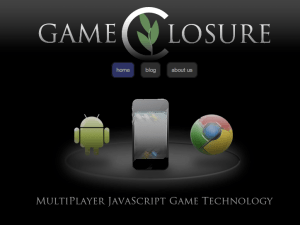 It’s probably fair to say that most people love the interactive experience of playing realtime multiplayer games, yet perhaps surprisingly, the majority of games on the App Store today are single player. Even the popular social games on Facebook don’t offer the rich experience of the classic multiplayer console games like Halo. This seems largely due to the fact that the coding, synchronizations, and de-buggings required to write multiplayer games can be difficult, time-consuming, and expensive. The same is only more true for multi-platform, multiplayer games.
It’s probably fair to say that most people love the interactive experience of playing realtime multiplayer games, yet perhaps surprisingly, the majority of games on the App Store today are single player. Even the popular social games on Facebook don’t offer the rich experience of the classic multiplayer console games like Halo. This seems largely due to the fact that the coding, synchronizations, and de-buggings required to write multiplayer games can be difficult, time-consuming, and expensive. The same is only more true for multi-platform, multiplayer games.
Enter Game Closure. Launching today at SSE Labs’ Demo Day at AOL, Game Closure is a smart new game development environment and SDK that makes it easy to create, host, and deploy HTML5-based cross-platform, multiplayer games, starting with iOS, Android, and Facebook.
Game Closure, which is essentially the gaming version of Heroku and Appcelerator, allows game developers to write a game in pure JavaScript and use standard HTML5 APIs. The startup’s SDK then compiles, deploys, and accelerates the game. No plug-ins are required, just a Web browser, and any old browser will do. When your game runs on non-browser platforms like mobile devices and tablets, the SDK creates an actual native app using APIs like OpenGL. Like their competitors, Game Closure offers developers everything they need to build, host, and deploy their games at warp speed.
Traditionally, game players are accustomed to experiencing platform lock-in when playing games. You have the games you play on Android, the games you play on your desktop, and your iPad. The same is true for developers: when writing games, they are generally required to create separate versions for each platform using fundamentally different technology. What’s so cool about Game Closure is that it allows players to seamlessly transfer live, running games to virtually any device and provides developers with all the tools to make cross-platform distribution fast and easy.
Game Closure is the project of Michael Carter, Martin Hunt, and Tom Fairfield, all of whom have prior experience with game development. Carter designed the initial WebSocket protocol for HTML5 and Hunt previously worked at Meebo, where he led the development of the “Meebo Bar”. Hunt is currently enrolled in Stanford’s Computer Science PhD program, studying Human-Computer interaction. Carter told me that, though the startup is currently boot-strapped, they’ve recently migrated their operations from “a basement closet” to the “luxurious AOL offices” in Palo Alto, thanks to SSE Labs’ partnership with AOL. I suspect that Game Closure is currently occupying the space reserved by AOL for TechCrunch’s offices, so I’m glad to see it’s being put to good use.
Fellow TechCruncher MG Siegler wrote a post last week on how the overall user experience of native apps far exceeds that of HTML5-based apps. Carter told me that he agrees with this assessment; during initial trials of games running in HTML5 on phones, he found that they “ran 30 times slower than browsers”. However, because HTML5 has a far richer set of tools and optimizations, it was far less complicated to develop those games in HTML5. To address this problem, the GC SDK includes a native (non-browser) implementation of the HTML5 APIs, accelerated for use on mobile devices, so that you can have your cake and eat it too, as they say.
According to Carter, all studios need to do is learn how to use standard HTML5 technologies and Game Closure will host and deploy their games on every relevant platform. Pretty cool.